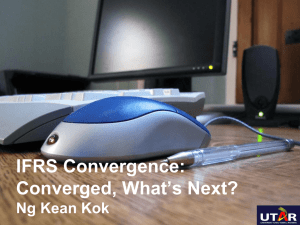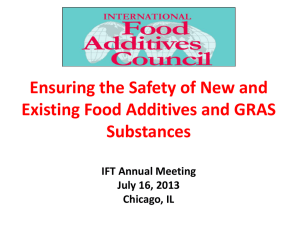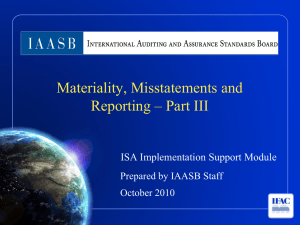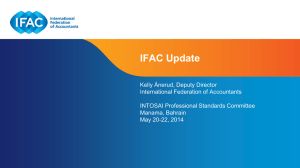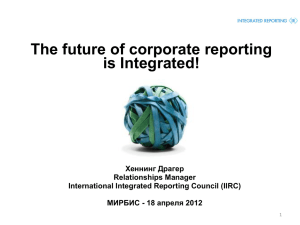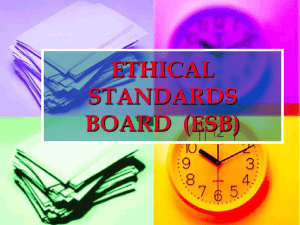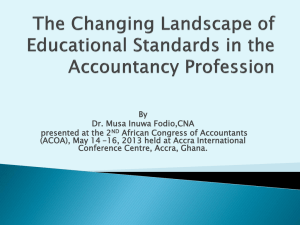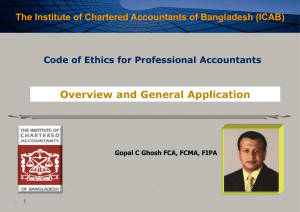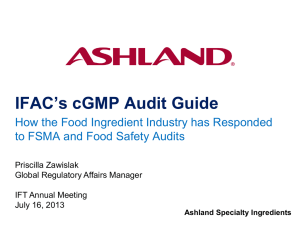reform proposals
advertisement
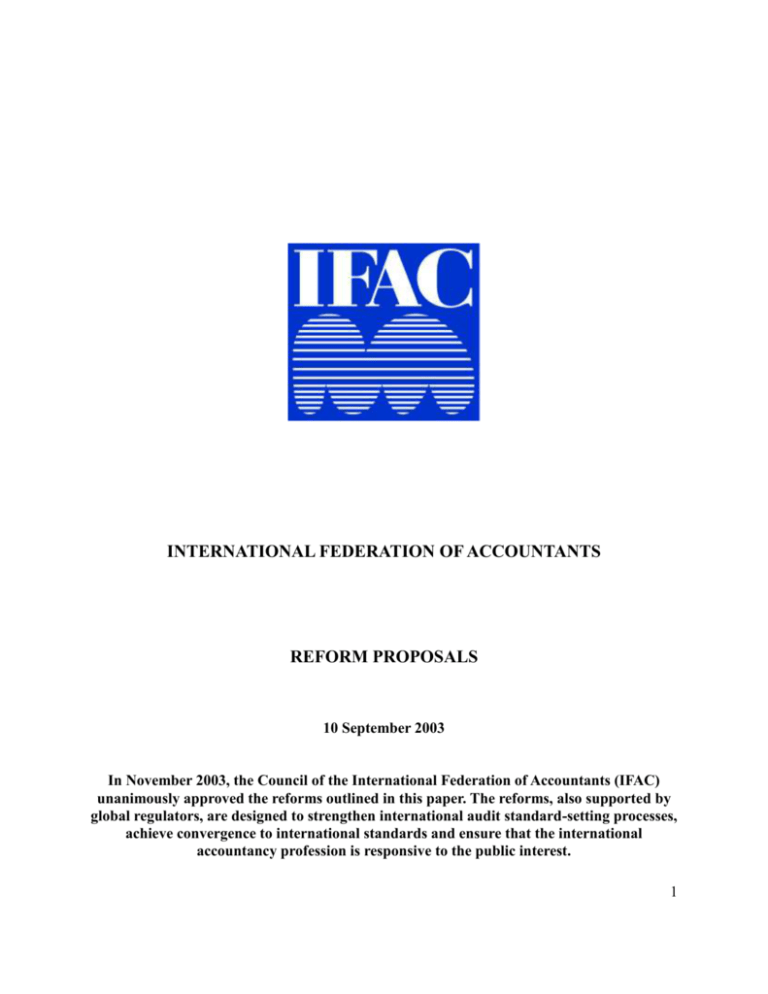
INTERNATIONAL FEDERATION OF ACCOUNTANTS REFORM PROPOSALS 10 September 2003 In November 2003, the Council of the International Federation of Accountants (IFAC) unanimously approved the reforms outlined in this paper. The reforms, also supported by global regulators, are designed to strengthen international audit standard-setting processes, achieve convergence to international standards and ensure that the international accountancy profession is responsive to the public interest. 1 2 IFAC REFORM PROPOSALS EXECUTIVE SUMMARY Introduction During 2003, the International Federation of Accountants (IFAC) reviewed its governance activities and regulatory responsibilities to determine how it could strengthen its role in ensuring that accountants worldwide fulfill their public interest responsibilities. As part of this process, IFAC engaged in an intense series of consultations with international regulatory agencies and other regional and international organizations. It also consulted with its member organizations and the accounting profession. The result of this collaborative effort is a series of reform proposals that IFAC views as critical to strengthening the accountability of the international profession and building investor confidence in financial reporting, in the work of auditors, and in financial securities markets worldwide. Scope and Objective of Proposals The objective of the reforms is to increase confidence that the activities of IFAC are properly responsive to the public interest and will lead to the establishment of high quality standards and practices in auditing and assurance. The reform proposals are also designed to contribute to the achievement of global convergence to high quality standards. Strong international standards of accounting, auditing, and professional ethics support effective and efficient capital markets leading to lower costs of capital, higher investment, greater innovation and more job opportunities. The focus of the reform proposals is those areas within IFAC that have the greatest impact on the public interest – primarily IFAC standard setting activities. These include the standard setting activities of the International Auditing and Assurance Standards Board (IAASB), the Ethics Committee, and the Education Committee. IFAC’s Public Sector Committee will be subject to a separate and independent review process in conjunction with the World Bank and other external parties with an interest in governmental financial reporting. Overview of Proposals The proposals provide for more transparent standard-setting processes; greater public and regulatory input into those processes; regulatory monitoring; and public interest oversight. The proposals also ensure that there is regular, ongoing dialogue between regulators and the accountancy profession. This is to be accomplished through the creation of several new structures, some of which will be within IFAC while others will be independent of it. Key features of the reform proposals include provision for the establishment of the following groups: Public Interest Oversight Board (PIOB) -- This board will oversee IFAC standard setting activities in the areas of audit performance standards, independence, and other ethical standards for auditors, audit quality control and assurance standards. It will also oversee IFAC’s proposed 3 Compliance Program. The PIOB will decide other areas that might fall within the scope of its oversight after consulting with the Monitoring Group (MG) and the IFAC Leadership Group (ILG) (see below). The composition of the PIOB will be selected by the MG. It will be made up of members of the organizations within the MG or their representatives. Monitoring Group (MG) -- The MG will comprise international regulators and related organizations including representatives of the International Organization of Securities Commissions, the Basel Committee on Banking Supervision, the European Commission, the International Association of Insurance Supervisors and the World Bank. The MG will update the PIOB regarding significant events in the regulatory environment, and among other things, will be the vehicle for dialogue between regulators and the international accountancy profession. IFAC Leadership Group -- The ILG includes the IFAC President, Deputy President, Chief Executive, the Chairs of the IAASB, the Transnational Auditors Committee, the Forum of Firms, and up to four other members designated by the IFAC Board. It will work with the MG and address issues related to the regulation of the profession. Public Input Additional public input into the standard setting process will be obtained through consultative advisory groups, whose members will provide input into the technical activities of each area. Under the reform proposals, the role of these groups is being augmented and strengthened. IFAC Council and Board The IFAC Council will continue to be responsible for overall governance of IFAC and the IFAC Board will oversee the management of the organization. Actions will be taken to ensure greater transparency and participation in the operations of the IFAC Council. As part of the reform, the IFAC Board will also take actions to enhance the transparency of certain IFAC activities, expand its size to include more member bodies, and ensure that IFAC meets its obligations to the PIOB. Timetable Pending approval by IFAC’s Council and support from regulators these proposals will come into effect in 2004. 4 REFORM PROPOSALS Contents 1. 2. 3. INTRODUCTION .........................................................................................................................................7 1.1 BACKGROUND ...................................................................................................................................7 1.2 OBJECTIVES .......................................................................................................................................7 1.3 PROCESS ............................................................................................................................................8 1.4 PROPOSALS FOR CHANGE ..................................................................................................................8 PUBLIC INTEREST OVERSIGHT BOARD .............................................................................................9 2.1 PRINCIPLE/CONCEPT OF THE PIOB’S ROLE........................................................................................9 2.2 OVERSIGHT OF IFAC PUBLIC INTEREST AUDITING ACTIVITIES........................................................ 10 2.3 PIOB REPORTING ............................................................................................................................ 11 2.4 PIOB OPERATIONS AND VOTING...................................................................................................... 12 2.5 SELECTION OF PIOB MEMBERS ....................................................................................................... 12 2.6 PIOB FUNDING ................................................................................................................................ 13 2.7 SIZE AND TERM ................................................................................................................................ 13 2.8 PIOB STAFF ..................................................................................................................................... 14 2.9 PIOB MEETINGS .............................................................................................................................. 14 2.10 THE TRANSPARENCY OF PIOB ACTIVITIES ...................................................................................... 14 MONITORING GROUP ............................................................................................................................ 14 3.1 MONITORING GROUP’S OPERATIONS ............................................................................................... 15 3.2 MONITORING GROUP ADVISORY INPUT ON STANDARD-SETTING ..................................................... 16 4. IFAC COUNCIL .......................................................................................................................................... 16 5. IFAC BOARD .............................................................................................................................................. 17 6. IFAC LEADERSHIP GROUP .................................................................................................................... 18 7. IFAC NOMINATING COMMITTEE ....................................................................................................... 19 8. INTERNATIONAL AUDITING AND ASSURANCE STANDARDS BOARD....................................... 20 9. 8.1 IAASB TERMS OF REFERENCE, INCLUDING COMPOSITION .............................................................. 20 8.2. IAASB CAG COMPOSITION, CHAIRMANSHIP AND ROLE ................................................................. 21 8.3 REVIEW AND OVERSIGHT ................................................................................................................. 21 ETHICS COMMITTEE ............................................................................................................................. 22 5 10. EDUCATION COMMITTEE .................................................................................................................... 22 11. COMPLIANCE ACTIVITY ....................................................................................................................... 23 11.1 ESTABLISHMENT OF A COMPLIANCE FUNCTION ............................................................................... 23 11.2 NATURE OF THE COMPLIANCE FUNCTION ........................................................................................ 24 12. PUBLIC SECTOR COMMITTEE ............................................................................................................ 25 13. EFFECTIVENESS ASSESSMENT ........................................................................................................... 25 14. CONCLUSIONS.......................................................................................................................................... 26 ATTACHMENT 1 IFAC ORGANIZATIONAL DIAGRAM ........................................................................... 27 6 1. INTRODUCTION 1.1 Background The background to these reform proposals lies in the decline in confidence in financial reporting and in the accounting profession associated with corporate collapses and failures in financial reporting and auditing in a number of countries. The consequence of this has been greater regulation of the profession in many countries in an attempt to restore public and investor confidence in financial reporting. While the events themselves have not occurred in all countries, they have significantly influenced the international regulatory environment in a way that requires a response. The address by the President of the International Federation of Accountants (IFAC) at the World Congress of Accountants in Hong Kong, November 2002, stated that there was a need to move towards a system of mixed regulation of the profession. The proposals below are IFAC’s response to the decline in confidence in financial reporting and auditing and the changed regulatory environment. These changes are designed to lead to higher quality standards and as a consequence enhanced performance by the accounting and auditing profession. This in turn should contribute to greater confidence in the quality of financial reporting and auditing. These proposals reflect the continuing commitment of the profession to its public interest role and to the goal of global convergence to high quality standards. Underpinning these proposals are a number of core values and beliefs. First, that the accounting and auditing profession has an obligation to serve the public interest. Secondly, that global convergence to high quality accounting, auditing and other professional standards is in the public interest. Thirdly, that transparency in standard setting leads to higher quality and more widely accepted standards. This paper does not seek to consider options or to explain the rationale for the design of the reform proposals. Rather, it should be seen as the product of the development process described below, which involved extensive discussion and consultation with a wide range of parties both internal and external to IFAC, and is intended to be a proposal that all parties involved can agree will help ensure that IFAC’s standard setting activities reflect the public interest and address the concerns of the regulatory community. 1.2 Objectives The objective of this proposal is to increase confidence that the public interest activities of IFAC (including the setting of standards by IFAC boards and committees1) are properly responsive to the public interest and will lead to the establishment of high quality standards and practices. These proposals will result in highly transparent standard setting processes with public and regulatory input, within a framework of regulatory monitoring and public interest oversight. 1 The standard setting activities of IFAC for the purposes of this document include those of the International Auditing and Assurance Standards Board, the Ethics Committee and the Education Committee. The Public Sector Committee is not covered by the public oversight elements of these arrangements, for reasons outlined in the text below, while other functions may be added in the future. 7 The proposed reforms are designed to achieve the following: An externally validated process for monitoring and oversight of IFAC’s standard setting and compliance regimes Increased transparency with respect to IFAC governance and its international standard setting activities Broad-based external participation in IFAC standard setting activities A more collaborative and comprehensive international process for determining how accountants and auditors can best contribute to the integrity of the international financial system. 1.3 Process The proposals contained in this paper are the result of a series of consultations between IFAC and international regulatory agencies and other regional and international organizations. These consultations commenced informally during the World Congress of Accountants in November 2002. At the IFAC Board meeting subsequent to the World Congress the Board established a group, designated here as the IFAC Leadership Group (ILG) (see Section 6 below), to formulate proposals for reform and to manage the reform process. In the period since November 2002 there has been extensive and constructive dialogue between IFAC and the international regulatory community 2 . There has also been consultation with other parties, including the member bodies of IFAC and the accounting firms. The proposals contained in this paper are the result of that process. IFAC and the regulators are aiming to achieve consensus on the acceptability of these proposals by early September 2003, allowing time for the proposals to be reflected in constitutional amendments for the November 2003 Council meeting of IFAC3. The reform proposals set out here also incorporate key elements resulting from the work of internal IFAC studies of its governance arrangements (the Governance Issues Group) and its compliance activities (the Compliance Working Group), both of which were approved by the IFAC Board at its meeting in July 2003. 1.4 Proposals for Change The overall structure of what is proposed in this document is reflected in the diagram in Attachment 1. However, it should be noted that the changes described in this proposal do not mark the end of the reform process – rather the process should be seen as being on-going. The 2 The organizations involved in this dialogue included the International Organization of Securities Commissions, the Basel Committee on Banking Supervision, the International Association of Insurance Supervisors , the Financial Stability Forum, the European Commission and the World Bank. 3 The IFAC Council is the annual meeting of IFAC member organizations. 8 initial reforms affect mainly the standard setting activities of IFAC. Subsequent reforms may, in addition, affect other public interest activities of IFAC. The IFAC Council, Board and President have responsibility for governance of IFAC (as laid out in the IFAC Constitution), and the Board through the Chief Executive has operational and management responsibility for its activities. The Public Interest Oversight Board will have oversight responsibility for certain IFAC activities as depicted in Attachment 1. As a result of these reform initiatives the standard setting boards and committees are intended to be independent and transparent in their standard setting roles, and each would have a mandate to act in the public interest. Each standard setting activity will have a consultative advisory group (CAG) comprised of individuals and representatives of external organizations that have an interest in the development of high quality international standards designed to serve the public interest. 2. PUBLIC INTEREST OVERSIGHT BOARD A key reform is the establishment of a Public Interest Oversight Board (PIOB). The objective of the PIOB is to increase the confidence of investors and others that the public interest activities of IFAC (including the setting of standards by IFAC boards and committees) are properly responsive to the public interest. 2.1 Principle/Concept of the PIOB’s Role The PIOB will act in an oversight role and will not act in a management role or operational role with respect to IFAC’s activities, which remain the responsibility of the IFAC Board. The PIOB shall be responsible for overseeing the public interest activities of IFAC related to auditing, giving priority, at least initially, to those standard setting activities related to audits and other financial statement assurance activities. The PIOB shall oversee IFAC standard-setting activities in the areas of audit performance standards, independence and other ethical standards for auditors, audit quality control and assurance standards, and other audit and auditor-related standards setting activities, consistent with the concept described above. IFAC’s proposed Compliance Program, which is currently being established, would be considered a public interest activity and thus should be overseen by the PIOB. The PIOB, the Monitoring Group (MG), and the ILG shall discuss whether particular IFAC activities should fall within the PIOB’s oversight, with the PIOB making the final decisions based on the principle discussed in the previous paragraphs of this section. The PIOB shall state the reasons for any decision to expand the scope of its oversight. If the PIOB should propose to extend its remit to include the oversight of the public interest activities of the Transnational Auditors’ Committee (TAC), which is a joint committee of IFAC and the Forum of Firms, there should be a prior dialogue between the MG, the ILG and the Forum of Firms. 9 The PIOB is to act in the public interest and be responsible to the public, not the IFAC Board or IFAC membership. The MG will monitor the PIOB’s activities with the principle set forth in this section in mind. 2.2 Oversight of IFAC Public Interest Auditing Activities IFAC shall develop and the PIOB shall approve the terms of reference (i.e., duties and scope of work, charter, operating procedures, etc.) of relevant IFAC boards and committees, such as the Ethics Committee, Education Committee, International Auditing and Assurance Standards Board (IAASB), as well as their Consultative Advisory Group(s) (CAG). Collectively these bodies are referred to as the Public Interest Activity Committees (PIACs 4 ). The PIOB may, within a reasonable time after its commencement and periodically thereafter, review the terms of reference of the PIACs in the light of significant developments, such as significant changes in the international regulatory environment. IFAC shall develop and the PIOB shall approve the nomination process for each PIAC, including the make-up of such PIAC, the qualifications of members, number of members, the make-up of the IFAC Nominating Committee, etc. The PIOB shall provide final approval of the chairs and other members of PIACs selected by the IFAC Nominating Committee. The PIOB shall have the authority to finally approve or reject any or all proposed members of PIACs for good cause, and shall state their reasons should they choose to reject one or more members. The PIOB shall have the authority to finally approve or reject the choice of the Chair of the IAASB, which is to be a full-time position. The PIOB shall also have the right to request the removal of the chair of any PIAC for good cause, and shall explain its reasons for doing so, should it choose to invoke this authority. The PIOB shall be consulted prior to any decision by the IFAC Board for the removal of members or chairs of PIACs, and the IFAC Board shall provide to the PIOB its reasons for proposing such actions.The PIOB shall oversee the work program and priorities of the PIACs, and the PIOB shall have access to all documentation related to the public interest activities under its oversight, including those associated with standard setting activities. The PIOB shall evaluate the due process in standard setting activities to be satisfied that the procedures ensure that the views of all stakeholders are sought and considered and that the PIAC's are accountable for their disposition of those views. The PIOB shall receive reports from IFAC as to the operation and effectiveness of such procedures. The PIOB shall evaluate the adequacy of funding provided to support the PIACs. 4 For reasons outlined in Section 12 below, the Public Sector Committee is not considered a PIAC. 10 The PIOB shall have the right to meet with all or some of the members of the IFAC boards or committees (including their Consultative Advisory Groups (CAGs)), or the ILG to discuss matters of interest to the PIOB. The IFAC Board shall provide information to the PIOB on its public interest activities according to the form, content and frequency requested by the PIOB. In addition, the PIOB chair may attend or may designate a PIOB member to attend as an observer, any IFAC meeting (other than those held in executive session for confidentiality reasons, such as those addressing personnel matters) which it considers might have an impact on the public interest. The PIOB shall have the right to meet with outside experts or organizations as it deems necessary. As the PIOB is responsible for oversight of IFAC public interest activities and not management of those activities, the PIOB shall not have the right to require specific changes to be made by IFAC in the procedures noted above. Rather, should the PIOB reject a PIAC’s terms of reference or procedures, IFAC will be responsible for developing new proposals to present to the PIOB. The PIOB shall explain to IFAC its reasons for rejecting any such terms of reference or procedures. While the PIOB shall have the right to suggest that a specific matter be added to the work agenda of a PIAC, it shall not have the right to require that a particular project be taken up by IFAC or a PIAC. However, it shall have the right to make recommendations to IFAC concerning all activities under its oversight. IFAC or the relevant PIAC shall either take up the recommendation or report to the PIOB about why it has not taken up the recommendation. PIOB responsibilities shall not include providing technical input or suggestions on the design or content of individual standards, approving proposed or final standards, etc. (For example, the PIOB shall not duplicate the role of the Consultative Advisory Group(s).) As such, the PIOB shall not have the authority to stop a PIAC from proposing or issuing any standard or document. The PIOB also shall not oversee the accounting standard-setting activities of the Public Sector Committee. 2.3 PIOB Reporting The PIOB shall prepare an annual report that discusses its own activities and evaluates how the public interest has been reflected in the activities that it oversees, including the PIACs. The PIOB report shall be available to the IFAC membership and the public (e.g., electronically), and shall be transmitted to the MG and the Financial Stability Forum and authorities responsible for the regulation of the profession on a national and international basis. The PIOB will also be free, as it sees fit, to prepare any other reports, notices, press releases, etc. One or more of these methods should be used, for example, to report significant concerns when they arise, rather than waiting for the annual report. The PIOB shall have the opportunity to address the IFAC Council if it determines that this is appropriate. 11 The PIOB will, if desired, have its own Internet site, separate from IFAC’s site, which would be used as seen fit by the PIOB. 2.4 PIOB Operations and Voting The PIOB will have the right to determine its legal form and operating procedures, and will have a chair. To enable its decision-making process to commence, the PIOB generally will reach its decisions based on a simple majority of its members. However, a two-thirds majority will be necessary to request the removal of the chair of any PIAC for good cause. Also, a two-thirds majority will be necessary to determine whether additional IFAC activities (that is, in addition to those identified in sections 2.1 and 2.2 above) are public interest activities that should fall under the PIOB’s oversight in accordance with the principle set forth in section 2.1. 2.5 Selection of PIOB Members PIOB members shall be selected by the current members of the MG (referred to as the Nominating Members (NMs)) – currently, the International Organization of Securities Commissions (IOSCO), the Basel Committee on Banking Supervision (Basel Committee), the International Association of Insurance Supervisors (IAIS), the World Bank, and the European Commission. In determining the composition of the PIOB, the goal of the NMs shall be to select members who as a group will contribute to restoring confidence of the worldwide investor community and other stakeholders by virtue of their status and representativeness. The NMs will determine the procedure for the selection of the PIOB chair. Each NM will choose a specified number of PIOB members. Each NM shall perform vetting of its nominees as appropriate, including reviews designed to avoid potential conflicts of interest. (NMs plan to identify common questions that would be included in such reviews.) The NMs will consider information provided by IFAC with respect to potential PIOB nominees, for example, information that would be helpful in avoiding potential conflicts of interest or risk of independence impairment. Each NM shall consult with the entire MG regarding its proposed nominees to the PIOB, but will be permitted to make its own decisions. Qualifications of Members: Members should be senior individuals of integrity and high reputation with an interest in and knowledge of the international issues relevant to the auditing and assurance function and of the role of such functions in the global capital markets. They must be committed to strongly supporting the development of high quality international auditing and assurance standards by IFAC and related high quality implementation practices by the international auditing profession. Moreover, they must have the ability and desire to serve the public interest in an independent and unbiased manner. Members shall be a mix of those appointed from within the senior official staff of the NMs and others appointed by the NMs and representing the public interest. 12 Members shall not be currently in public practice as auditors or working for a firm that performs audits, but might be persons practicing in another area of auditing (e.g., an Auditor General) or accounting. However, at least one member of the PIOB should have recent and significant senior audit experience in the private sector. Although this member of the PIOB, like the others, will be chosen by the NMs, the NMs will consider potential nominees with the appropriate experience that IFAC recommends. Once chosen, members shall agree to serve in the interests of the public as a whole, not the interests of their respective nominating body. In the event a position on the PIOB becomes vacant, the NM that nominated the vacating member shall choose the replacement, subject to the normal provisions and procedures for choosing members. The NMs shall retain the right to determine whether other organizations should be included as NMs. 2.6 PIOB Funding In order to assure appropriate independence of the PIOB, the PIOB, the MG, and IFAC shall agree on an adequate annual budget for the PIOB. It is expected that initially this annual budget would not exceed US$1.5 million. Future funding levels agreed to by the PIOB, the MG, and IFAC shall include appropriate inflation and foreign currency adjustments. To enable the PIOB to get established immediately with the knowledge that it will have a stable funding source, IFAC will fully commit to cover the PIOB’s funding at the level agreed to, adjusted for inflation and foreign currency adjustments, for a period of five years. As a general principle, both IFAC and the MG consider it to be in the public interest that parties other than IFAC shall fund at least 50% of the cost of the PIOB. IFAC will seek contributions to cover 50% or more of the PIOB costs. Given the public interest nature of the oversight activities of the PIOB, the MG members may provide contributions to support the PIOB’s activities. The PIOB may also be involved in seeking contributions to cover its costs. PIOB funding shall cover meeting costs, transportation and accommodation costs (e.g., for meetings and other PIOB activities), costs of PIOB reports and the PIOB internet website, research necessary for the PIOB to accomplish its mission, salaries and benefits of PIOB staff, office space and reasonable overhead, as well as a stipend, if deemed appropriate, to the PIOB members. 2.7 Size and Term The PIOB should be of a relatively small size, large enough only to assure sufficient expertise and representation of the NMs. The precise size, to be determined, shall not be more than 10 members. 13 Generally, the PIOB members shall serve a term of 3 years, with a maximum potential service of 2 terms. However, a PIOB member that has served 2 terms may serve a third term if selected as the PIOB chair for that third term. The PIOB will have the authority to remove a PIOB member before the end of the term for poor performance, conflicts of interest, dishonesty, or otherwise not acting in the public interest. The MG may also recommend to the PIOB that removal or other actions be taken if it becomes aware that a PIOB member has a potential conflict of interest or otherwise is not acting in the public interest. 2.8 PIOB Staff The size and make-up of the PIOB staff will eventually be determined by the PIOB, within the framework of the agreed-upon budget. It is assumed that the PIOB will have a small staff of professional employees whose work is dedicated to the PIOB, with the appointment of such staff being the responsibility of the PIOB. Where the PIOB wishes that significant individual projects, such as research studies, be undertaken using IFAC staff the use of such staff (though not the nature of the study or project) would be the subject of negotiation between the Chief Executive of IFAC and the Chair of the PIOB, and would be funded from the budget of the PIOB. It is contemplated that the PIOB will utilize the staff resources of IFAC and the MG to the extent appropriate. For example, the PIOB shall have access to the IFAC administrative staff in support of their activities, through the IFAC Chief Executive as their interlocutor. Any IFAC staff utilized by the PIOB in this way shall be obliged to respond to PIOB requests without impediment. The PIOB may delegate its day-to-day tasks to the staff, but the staff shall not have the authority to approve significant actions, such as the make-up of PIACs, the release of the annual report, etc. 2.9 PIOB Meetings The PIOB shall meet twice annually, or more often if deemed appropriate, to carry out its activities. As the PIOB professional staff will provide information and day-to-day monitoring, frequent meetings should not be necessary. 2.10 The Transparency of PIOB Activities The PIOB shall conduct its activities and processes in ways that meet high standards of transparency. The matters covered in the proposals for a PIOB will be reflected in the IFAC Constitution and Rules, IFAC Committee Terms of Reference and other documentation, the PIOB Charter and the PIOB operating procedures, or elsewhere, as appropriate. 3. MONITORING GROUP The MG is a group of regulatory and international organizations that have a responsibility to protect and advance the public interest and are committed to strongly supporting the development of high quality international auditing and assurance standards by IFAC and related high quality implementation practices by the international auditing profession. The group 14 includes representatives of IOSCO, the Basel Committee, the IAIS, the World Bank, and the European Commission. The MG may in the future include representatives of other regulatory and international organizations as members or observers. The MG will not be established as a legal entity. (See also Section 13 which discusses the MG’s effectiveness assessment.) 3.1 Monitoring Group’s Operations The MG will meet as it deems appropriate, in order to evaluate the continuing IFAC reforms and the operations of the PIOB. The MG shall have the right at any time to make recommendations to IFAC and the PIOB. Members of the MG will update the PIOB and/or the PIOB staff on significant events in the regulatory environment (including those that relate to audit requirements and practices), or other areas to assist the PIOB in carrying out its responsibilities. The MG will also meet at least annually with the ILG in order to facilitate dialogue about the recent activities of IFAC and the PIOB, the progress in implementing reforms, and the MG members’ views on regulatory developments, audit quality issues, and other matters of mutual interest. The MG and the ILG will seek to maintain the spirit of collaboration that has lead to the establishment of the present arrangements. All members of the MG are committed to strongly support the development and issuance of high quality international auditing and assurance standards by IFAC’s standard setting committees. The MG members support the principle of convergence to high quality international standards and will engage, as appropriate, with national bodies to that end. All members of the MG are also committed to strongly support high quality practices by the international auditing profession. However, participation by any representative of a regulatory or international organization in the MG does not imply or require endorsement of IFAC actions or publications or the standards set by any IFAC PIAC. Endorsement or adoption of standards is left to each organization, or to appropriate national bodies. The PIOB, MG, and ILG shall discuss whether particular IFAC activities should fall within the PIOB’s oversight, with the PIOB making the final decisions based on the principle discussed in Section 2.1 above. The MG will bear the cost of its meetings and related activities, with the exception of those costs of IFAC and PIOB members invited to participate in its meetings. 15 3.2 Monitoring Group Advisory Input on Standard-Setting Members of the MG shall have the opportunity at the technical level to provide input on standard-setting activities. 5 This should generally be accomplished through the methods that have been in place in the recent past, as follows: MG members would be offered the opportunity to be represented on the CAG for each relevant IFAC board or committee. The chairs of the CAGs shall be entitled to attend as participating observers and speak at any meeting of the relevant standard setting boards or committees. The chair of the CAGs will have the right under the IFAC reform proposals to have an appeal role with respect to the observance of appropriate due process by the IAASB. Members of the MG will, if desired, comment on proposed standards. When they do so, the relevant IFAC standard setting board or committee should give strong consideration to such comments, and, if the comment is not to be taken up in the final standard, should explain to the relevant MG member the reasons for that decision. Standard setting boards and committees should be available for additional meetings, as desired, with the members of the MG.6 4. IFAC COUNCIL It is proposed that through the IFAC Council the IFAC Constitution be amended by a number of changes, including those recommended by the IFAC Governance Issues Group, which enable greater transparency and greater external involvement in the activities of IFAC, as well as a greater speed of response to emerging or current issues. These include changes that would: Approve those constitutional changes necessary to establish IFAC’s relationship with the PIOB, including those that give effect to the obligations IFAC has undertaken in relation to the PIOB Approve such constitutional changes as are necessary to enable a wider range of individuals from outside IFAC to be appointed to IFAC boards and committees Ensure greater transparency in the operations of the IFAC Council, with the appropriate parts of the agenda and minutes to be in the public domain Provide a clearer separation of the formal business of the Council meeting from more participatory sessions in which the involvement of external parties is possible 5 This is not meant to suggest that only MG members will have this opportunity. Indeed, it is contemplated that, at IFAC’s invitation, other regulators and interested parties (for example, the United Nations (e.g., UNCTAD), INTOSAI, and financial statement users) will be represented on the CAGs and will otherwise have the opportunity to provide input. It is important that those organizations selected for participation in the CAG are important stakeholders that have a commitment to high quality international auditing and assurance standards and practices. 6 To minimize costs and inconvenience, the MG will endeavor to schedule such meetings alongside scheduled meetings of standard setting boards or committees or simply meet with the chairs of the standard setting boards or committees chairs (instead of with the full membership of the standard setting boards or committees), whenever possible. 16 Provide for the formal establishment of the standard setting boards or committees in the IFAC Constitution, with their respective terms of reference specified in the IFAC Rules Establish the right of the PIOB, through its chair, to bring matters to the attention of the Council and to present those issues to the Council, and where circumstances warrant for the members of the PIOB to meet with the Council. In general, the proposals for reform do not substantially change the functioning of the Council. They do make its operations more transparent. They also acknowledge and give effect to the PIOB’s responsibility for independent oversight of IFAC’s public interest activities. At the same time the Council retains its own oversight function in relation to all IFAC activities. 5. IFAC BOARD The key proposals below result from the work of the IFAC Governance Issues Group, which reviewed the IFAC constitutional changes given effect in 2000. The key changes proposed in relation to the IFAC Board are: A formal constitutional requirement that the President, Deputy President and Board members make a declaration that they will act in the public interest and with integrity in discharging their roles within IFAC. Chairs and members of IFAC boards and committees will also be required to make this same declaration An increase in Board membership, from 16 members to 21 members, to enable a wider member body representation on the Board A more transparent process for the selection of Deputy President, involving both Board members and member bodies Changes to the criteria adopted by the IFAC Nominating Committee to recognize that the over-riding principle of the “best person for the job” encompasses issues of the size of member body, geography and sector of the profession as factors to be considered The Board will have the function of ensuring that the obligations of IFAC with respect to the PIOB are met, for example the provision of information to the PIOB The Board will in the future approve for submission to the PIOB the names of the chairs and members of the PIACs The Board will in the future consult with the PIOB prior to any decision to remove chairs or members of the PIACs The Board will in future approve for submission to the PIOB all changes proposed to the terms of reference of the PIACs The establishment of formal terms of reference for the Audit Committee of the Board The right of the PIOB, through its chair, to bring matters to the attention of the Board and to present those issues to the Board, and where circumstances warrant for the members of the PIOB to meet with the Board. 17 The establishment of the PIOB, and the right of the chair of the PIOB (and where warranted the members of the PIOB) to raise issues with the Board, enables any public interest issue identified by the PIOB to be transmitted to the Board. The establishment of the PIOB does not detract from the governance responsibilities of the Board in respect of the management and operations of IFAC. After the PIOB is established and fully operating, IFAC will conduct a further review of the composition of its Board, in consultation with the PIOB, specifically to address the desirability of having on the Board a number of public members. 6. IFAC LEADERSHIP GROUP The ILG has been established by IFAC to address reform implementation issues and other important matters. Going forward, IFAC wishes to continue to have the involvement of such a group in its relationship with the MG, and for other purposes related to the regulation of the profession. IFAC has assigned to the ILG the responsibility to work on its behalf to assure that IFAC’s public interest activities are responsive to changes in the regulatory environment and international economy and that the reforms are being appropriately implemented. IFAC has also assigned to the ILG the role of identifying issues inside and out of the profession that could have a negative impact on the confidence of the public in the quality of financial reporting and of audit and assurance activities. The ILG will work on behalf of IFAC to encourage all sectors of the profession, including those working in developing or developed nations, in practice, in industry, government or academia, whether for large or small organizations, to take responsibility for restoring the confidence of the public in financial reporting and in audit and assurance activities. The ILG members are the President, Deputy President, and the Chief Executive of IFAC, the chairs of the IAASB, the TAC, and the Forum of Firms, and up to four other members designated by the IFAC Board. The chairs of the Education and Ethics Committees may also be considered for membership, and will in any event be part of the meetings of the ILG when matters involving their committees are being considered. The MG will also meet at least annually with the ILG in order to facilitate dialogue about the recent activities of IFAC and the PIOB, the progress in implementing reforms, and the MG members’ views on regulatory developments, audit quality issues, and other matters of mutual interest.7 As discussed in Section 13 below, the ILG may also perform a review of the effectiveness of the PIOB and the PIACs and discuss its review with the MG and the PIOB. 7 The ILG may also have discussions with, or otherwise provide information to, the PIOB on its activities and views if needed. 18 The PIOB, MG, and ILG shall discuss whether particular IFAC activities should fall within the PIOB’s oversight, with the PIOB making the final decisions based on the principle discussed in Section 2. IFAC may also include in an annual report a discussion of how the public interest has been reflected in its activities, including any reforms implemented with respect to the PIACs and the CAG(s). 7. IFAC NOMINATING COMMITTEE Consistent with the common understanding reached between IFAC and the MG, the PIOB will have the authority to approve the appointments of chairs and members of PIACs, and to request the dismissal of the chairs of PIACs. The IFAC Nominating Committee activities are for this reason subject to the oversight of the PIOB. For the PIOB to approve nominations referred to it by the IFAC Board, on the recommendation of the IFAC Nominating Committee, a simple majority vote of the PIOB will be required. However, for the PIOB to request dismissal of the chair of a PIAC, a two-thirds majority will be required. A key element in making the activities of IFAC more transparent is the process carried out by the IFAC Nominating Committee. The changes proposed in this area are: Given the role of the PIOB in approving committee member nominations, it is proposed that the PIOB shall have permanent observer status on the IFAC Nominating Committee with full access to papers and speaking rights Conducting a more transparent selection process, with the process, committee membership, terms of reference, and operating procedures of the IFAC Nominating Committee posted on the IFAC website Enabling the IFAC Nominating Committee to have the authority to recommend to the IFAC Board the removal of chairs or members of PIACs for non-performance or other good cause, with the Board consulting with the PIOB in relation to any recommendation for the dismissal of a chair or member Noting that as elements of the primary requirement that the IFAC Nominating Committee follows the “best person for the job” principle, the IFAC Nominating Committee should consider factors that include sector of the accounting profession, size of the organization, and level of economic development of the member’s country All candidates for positions on the PIOB, IFAC boards and committees will be required to accept that if they are appointed they will be required to make a declaration that they will act in the public interest and with integrity in discharging their future roles. 19 8. INTERNATIONAL AUDITING AND ASSURANCE STANDARDS BOARD The nature of the changes to the functioning of the IAASB, detailed below, reflect increasing confidence on the part of the regulatory community with the operations of the IAASB and its CAG, following significant reforms given effect in 2002. However, these proposals do also identify some areas where the structures and processes of the IAASB can be further strengthened. Given the public interest in the effective functioning of capital markets, and the importance of audited financial statements to those markets, the development of International Standards on Auditing is a public interest activity, and will be subject to PIOB oversight. The present IAASB arrangements for due process and transparency include the following: Meetings are open to the public Standards are exposed for public comment before adoption, and comments are publicly available Agendas and minutes are, with the exception of matters dealt with in closed session, publicly available The IAASB has a CAG which meets twice a year. While the creation of the IAASB and its CAG have significantly improved the transparency of the process for setting International Standards on Auditing, there are a number of ways in which the process can be further improved to provide added assurance that it is operating transparently and in the public interest. The further changes proposed are listed below. 8.1 IAASB Terms of Reference, Including Composition In order to enhance the avenues for direct input to the IAASB’s processes from the regulatory agencies and other interested parties, and to increase the IAASB’s effectiveness, it is proposed that: The IFAC Constitution formally recognizes the IAASB’s existing authority and composition, contained in its terms of reference, to issue standards and other pronouncements8 The Chair of the IAASB be a full-time position, as soon as administrative and financial arrangements are in place The Chair of the CAG be an observer to the IAASB, with speaking rights The Planning Committee of the IAASB should be renamed Steering Committee and be supplemented by a member of the CAG The membership, terms of reference and operating procedures of the Steering Committee be posted on the IFAC website 8 See also Section 2.2 with respect to the PIOB’s review of the terms of reference. 20 The present arrangements for liaison between the IAASB and national standard setters be developed and formalized Public hearings9 be held where the nature of the standard, the level of interest or for some other reason wider consultation would be appropriate All members of the IAASB will be required to sign a declaration that they will act with integrity and in the public interest in the discharge of their role within IFAC. 8.2. IAASB CAG Composition, Chairmanship and Role The objective of the IAASB CAG is to provide technical advice to the IAASB as part of its standards setting activities. To further strengthen the role of the CAG it is proposed that: The CAG elects from amongst its members a chair, who shall be responsible, in liaison with the Chair and Technical Director of the IAASB, for determining the agenda of the CAG The Chair of the CAG should be an observer to the IAASB The CAG shall be able to appoint one of its members to the Steering Committee of the IAASB The membership of the CAG be reviewed to ensure that all members of the MG are represented and to consider adequate representation, as appropriate, from other regulators, international organizations, users, and preparers. The review should also address whether there is a balanced geographical spread The Chair of the CAG, in conjunction with the group as a whole, has the power to hear and to reach conclusions on matters concerning IAASB due process. Where external parties are of the view that the IAASB has not complied with its stated due process, for example, in failing properly to address the concerns expressed by outside parties on an exposure draft and in not expressing the reasons for which they reject these concerns, they can raise this matter with the Chair of the CAG. This right relates only to issues of due process. The nature of any “appeals” shall be public information, as shall the resolution thereof by the CAG. The normal resolution would be to bring breaches of due process to the attention of the PIOB. In addition to the above reforms, in order to enhance the transparency of the process, it is proposed that the membership, terms of reference and operating procedures of the CAG be posted on the IFAC website. 8.3 Review and Oversight To provide external assurance that the due process is followed it is proposed that: 9 With the establishment of the PIOB, the observance of due process will be a key focus of the PIOB’s oversight of the IAASB Meetings of the IAASB are already held in public, with agenda and minutes also publicly available. 21 The IAASB website includes a specific description of the due process adopted to promulgate standards The annual report of the IAASB describes the manner in which the IAASB has complied with its due process during the period. 9. ETHICS COMMITTEE The Ethics Committee of IFAC is responsible for developing the Code of Ethics for Professional Accountants (the Code), which serves as the foundation for codes of ethics developed and enforced by member bodies. A key concept embraced by the Code is “integrity”, that is, putting professional responsibilities ahead of business or client interests. The Code applies to all professional accountants, including those in commerce, industry and the public sector. For this and other reasons the development of the Code is a public interest activity, and will be subject to PIOB oversight. In relation to the membership of the Ethics Committee, the following reforms are proposed: Membership shall be increased by two public members, who shall include a specialist in business ethics The members appointed from member body nominations shall include an appropriate balance of members from business and government, and from small and medium-sized firms and practices The two observers appointed by the Forum of Firms shall be replaced by voting members, selected by the IFAC Nominating Committee from nominees presented by the Forum of Firms in a proportion similar to that established in the IFAC Constitution for the IAASB All members of the Ethics Committee will be required to sign a declaration that they will act with integrity and in the public interest in the discharge of their role within IFAC. A CAG shall be established, with the composition of the group and its operating procedures to be determined. Under the IFAC Constitution the Ethics Committee shall be given the authority, after having followed due process, to issue the Code. Due process for the Ethics Committee shall be as for the IAASB, and the same transparency requirements shall apply. 10. EDUCATION COMMITTEE The Education Committee is at an early stage in its standard setting process, with the first set of standards having recently been approved. Nevertheless, the International Education Standards have a high level of significance for the long-term global development of the accounting profession. These standards are significant both for their implications for the competence of accountants as well as for the way they affect trade in accounting services. For these and other 22 reasons the development of International Education Standards is a public interest activity, and will be subject to PIOB oversight. Proposed reforms to the membership and processes of the Education Committee are as follows: Under the IFAC Constitution the Education Committee shall be given the authority, after having followed due process, to issue standards and other pronouncements The Education Committee shall have two public members The two observers appointed by the Forum of Firms will be replaced by voting members, selected by the IFAC Nominating Committee from nominees presented by the Forum of Firms in a proportion similar to that established in the IFAC Constitution for the IAASB A review of the due process with a view to strengthening it to reflect the processes of the IAASB, to the extent appropriate Full transparency of activities, in line with those of the IAASB Establishment of a CAG that has representation of the different sectors of the profession, users of accounting services, academic representatives, and international agencies with the composition of the group and its operating procedures to be determined All members of the Education Committee will be required to sign a declaration that they will act with integrity and in the public interest in the discharge of their role within IFAC. 11. COMPLIANCE ACTIVITY 11.1 Establishment of a Compliance Function During 2003, the IFAC Compliance Working Group has considered the best way for IFAC to move forward with the proposal that it establish a compliance function. The group reported to the July 2003 meeting of the IFAC Board, at which meeting the IFAC Board approved unanimously the following: To create and implement an IFAC compliance function To endorse the primary emphasis of the compliance function as being one of improvement and encouragement To endorse the specific objectives for the compliance function outlined in Section 11.2 below To approve that the compliance function be the responsibility of the IFAC staff reporting to the Chief Executive To approve the dissolution of the current IFAC Compliance Committee and the establishment of a Compliance Advisory Panel consisting of five experts in compliance matters, one of whom shall be selected as Chair. The Panel shall be selected by the IFAC Nominating Committee to provide a broad geographic representation, from nominations made by member bodies. The IFAC Nominating Committee shall make their recommendations to the IFAC Board for their approval to submit to the PIOB 23 To approve the resources requested as part of the overall approval for the 2004 budget. The focus of the compliance activity will be on long-term improvement in the practice of accounting in all spheres of professional activity. The compliance function is based on a process of self-assessment and gap analysis, followed by the development and implementation of an action plan by each member body. These action plans are designed to improve the level of compliance by member bodies with the obligations of membership and to ensure that member bodies fulfill these obligations to the extent possible and otherwise meet the criteria of membership on a continuing basis. Compliance with the obligations associated with membership of IFAC is a significant means by which the accounting profession, through its professional institutes, contributes to the public interest, and for this reason the compliance function is to be included within the oversight of the PIOB. 11.2 Nature of the Compliance Function The primary emphasis of the compliance function will be on improvement and encouragement. Bearing in mind this primary emphasis, and with due consideration of the current regulatory environment, the following specific objectives have been established for the compliance function: Support the development of high quality auditing, ethical, accounting and related standards Contribute to global convergence towards such standards Understand, articulate and disclose the status of the introduction and implementation of IFAC standards and International Financial Reporting Standards (IFRSs) at a national level Understand, articulate and disclose the mechanisms in place for monitoring compliance with IFAC standards and IFRSs once introduced at a national level Understand, articulate and disclose the mechanisms in place for investigation and discipline of instances of non-compliance with standards at a national level Operate with transparency and disclose compliance assessment for each member body via publication of assessment on the IFAC web site Work with member bodies and other key constituencies to identify the barriers and obstacles in adoption and implementation of IFAC standards and IFRSs (and the reasons for such barriers and obstacles) and work with member bodies to develop action plans to address these issues Monitor progress of such action plans Provide support, encouragement and assistance, directly or indirectly, to member bodies in order to help meet their action plan objectives In circumstances where a member body does not have responsibility for standards and/or monitoring and there is not adequate progress towards convergence with IFAC standards and IFRSs, draw public attention to this fact 24 For member bodies that maintain a substantial self-regulatory role, consider with such member bodies additional tests of effectiveness and rigor of the self-regulatory regime In circumstances where member bodies have responsibility for standards and monitoring and there is inadequate progress on an agreed action plan (or an adequate action plan is not place), eventually consider appropriate sanctions against that member body. The approved reforms will be achieved through, amongst other things: A fully transparent self-assessment process on the part of member bodies o Regulatory framework within the specific country described o Compliance with member body obligations self-assessed and posted on the IFAC website o Presidents and Chief Executives of member bodies to sign off on the accuracy of the member body returns A cooperative arrangement with the international financial institutions that enables suitable inspection processes to be implemented. Consistent with the requirements of other holders of IFAC committee appointments, all members of the Compliance Advisory Panel will be required to sign a declaration that they will act with integrity and in the public interest in the discharge of their role within IFAC. 12. PUBLIC SECTOR COMMITTEE The Public Sector Committee (PSC) will be subject to a separate, and independent, review process in conjunction with the World Bank and other external parties with an interest in governmental financial reporting. It is intended that the review should be conducted in 2003. Notwithstanding this, and consistent with the requirements of other holders of IFAC committee appointments, all members of the PSC will be required to sign a declaration that they will act with integrity and in the public interest in the discharge of their role within IFAC. The PSC has successfully completed the development of a core set of financial reporting standards for the public sector, and this is an appropriate time to consider in depth the governance and funding arrangements of the PSC. Such a review would be designed to ensure that the PSC is structured and resourced to achieve the long-term objective of high quality financial reporting in the public sector. The omission of the PSC from the scope of the PIOB is notwithstanding that it is one of IFAC’s public interest activities – the omission relates to the primary concern of the MG being with IFAC’s auditing and assurance activities. 13. EFFECTIVENESS ASSESSMENT Five years after the formation of the PIOB, the MG shall perform a review of the effectiveness of the PIOB and the PIACs. This review shall include consideration of all of the items discussed in 25 this paper, as well as any other aspects of IFAC’s operations thought appropriate by the MG, and shall also include an assessment of the continuing need for and role of the MG. The MG shall have the right to make recommendations to IFAC and the PIOB based on this assessment. Given the rapidly changing environment or developments within IFAC or the PIOB, the MG may decide at any point that an interim effectiveness review should be conducted. As mentioned in section 6, the ILG may also perform a review of the effectiveness of the PIOB and the standard setting committees for discussion with the MG and the PIOB. The results of an interim review can, if determined appropriate by the MG, trigger the effectiveness assessment that would otherwise take place after five years. 14. CONCLUSIONS The proposals above represent a far-reaching and comprehensive set of changes to make the activities of IFAC more transparent and open to involvement and oversight by external parties with a legitimate public interest in those activities. These changes are designed to lead to higher quality standards and as a consequence enhanced performance by the accounting and auditing profession. This in turn should contribute to greater confidence in the quality of auditing and financial reporting. 26 ATTACHMENT 1 IFAC ORGANIZATIONAL DIAGRAM MONITORING GROUP1 IFAC COUNCIL FORUM OF FIRMS NOMINATING COMMITTEE AUDIT COMMITTEE IFAC LEADERSHIP GROUP IFAC BOARD CAG TAC OTHER TASKFORCES & GROUPS PAIB COMMITTEE PUBLIC INTEREST OVERSIGHT BOARD PUBLIC SECTOR COMMITTEE CAG COMPLIANCE ADVISORY FUNCTION EDUCATION COMMITTEE CAG ETHICS COMMITTEE CAG IAASB KEY 1 ACCOUNTABILITY consultation and advice (Section 3), however, it will also have appointment OVERSIGHT powers and the authority to conduct effectiveness reviews (Section 13). The Monitoring Group’s ongoing relationship with the PIOB will be one of CONSULTATION/ ADVICE 27
